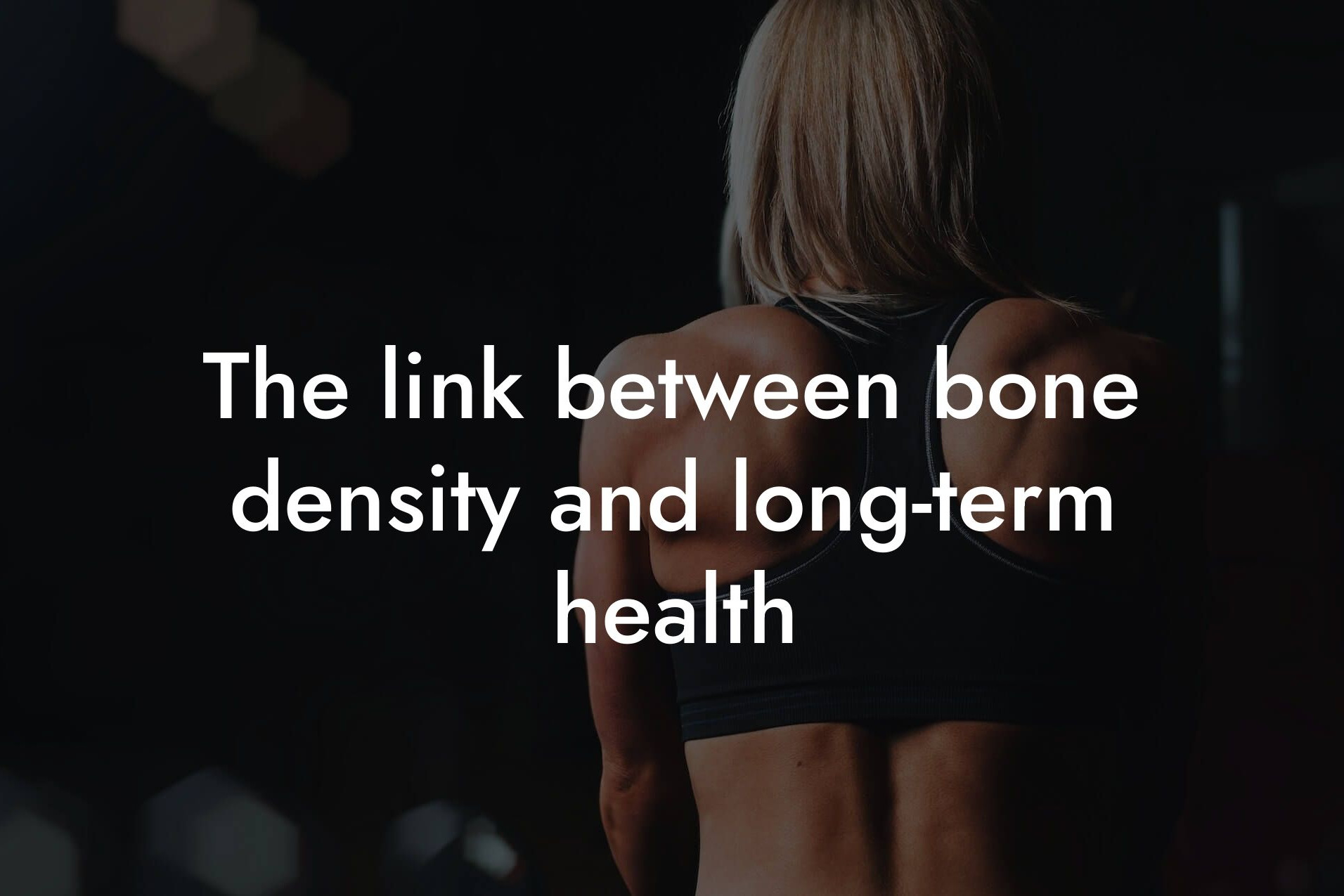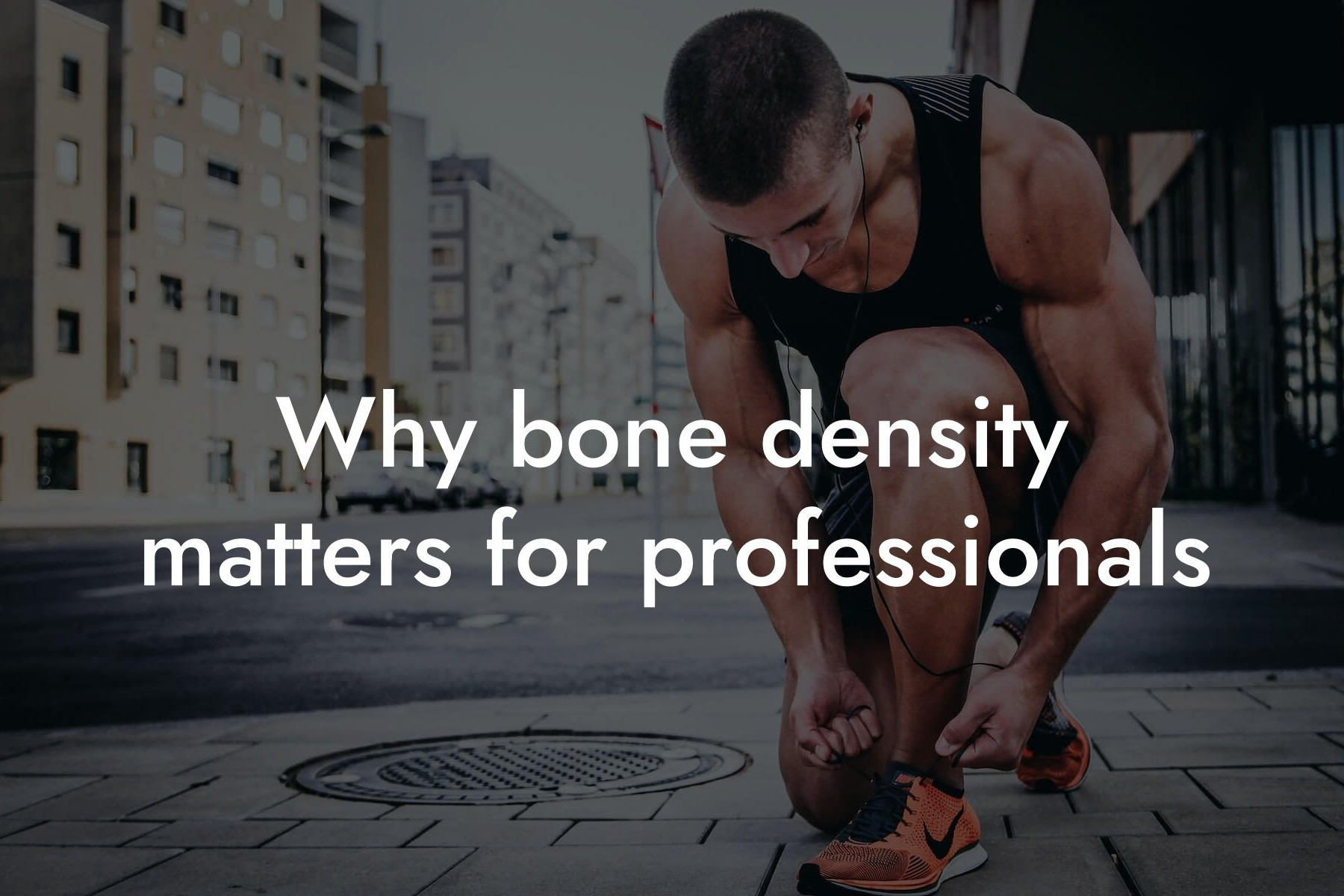As high-earning professionals, you understand the importance of maintaining a healthy physique and body composition to perform at your best. One crucial aspect of overall health that is often overlooked is bone health. Strong bones are essential for supporting your body's structure, enabling you to move with ease, and preventing injuries. Two essential nutrients that play a vital role in maintaining healthy bones are calcium and vitamin D. In this article, we will delve into the importance of calcium and vitamin D in bone health, how they work together, and provide you with the knowledge you need to optimize your bone health.
Table of Contents
- What is Calcium and Why is it Important for Bone Health?
- The Importance of Vitamin D in Bone Health
- How Calcium and Vitamin D Work Together
- The Consequences of Calcium and Vitamin D Deficiencies
- Who is at Risk of Calcium and Vitamin D Deficiencies?
- How to Optimize Calcium and Vitamin D Levels
- Frequently Asked Questions
What is Calcium and Why is it Important for Bone Health?
Calcium is a mineral that is essential for building and maintaining strong bones and teeth. It is the most abundant mineral in the human body, making up approximately 1.5% of an adult's total body weight. Calcium plays a crucial role in bone health by helping to build bone tissue, maintain bone density, and facilitate muscle function. Without sufficient calcium, bones can become weak, brittle, and prone to fractures.
The Importance of Vitamin D in Bone Health
Vitamin D is a fat-soluble vitamin that plays a critical role in maintaining strong bones. It helps the body absorb calcium, which is essential for building and maintaining bone tissue. Vitamin D also regulates parathyroid hormone levels, which helps to maintain calcium levels in the blood. Without sufficient vitamin D, the body is unable to absorb calcium effectively, leading to weak and brittle bones.
How Calcium and Vitamin D Work Together
Calcium and vitamin D work together in a synergistic relationship to maintain strong bones. Calcium provides the building blocks for bone tissue, while vitamin D helps the body absorb and utilize calcium effectively. When calcium and vitamin D levels are optimal, bones are able to grow and develop normally, and bone density is maintained. Conversely, when levels are inadequate, bones can become weak and brittle, leading to an increased risk of osteoporosis and fractures.
The Consequences of Calcium and Vitamin D Deficiencies
Deficiencies in calcium and vitamin D can have severe consequences on bone health. Osteoporosis, a condition characterized by brittle and porous bones, is a common result of inadequate calcium and vitamin D levels. Osteoporosis can lead to an increased risk of fractures, particularly in the hips, spine, and wrists. Additionally, deficiencies in calcium and vitamin D have been linked to an increased risk of osteopenia, a condition characterized by low bone density.
Who is at Risk of Calcium and Vitamin D Deficiencies?
Certain individuals are at a higher risk of developing calcium and vitamin D deficiencies. These include:
- Older adults, particularly those over the age of 70
- Individuals with a family history of osteoporosis
- Those with a diet low in calcium and vitamin D
- Vegetarians and vegans who do not consume dairy products
- Individuals with certain medical conditions, such as celiac disease or Crohn's disease
How to Optimize Calcium and Vitamin D Levels
Optimizing calcium and vitamin D levels is crucial for maintaining strong bones. Here are some tips to help you achieve optimal levels:
- Consume a diet rich in calcium, including dairy products, leafy greens, and fortified foods
- Take a calcium supplement if necessary, but always consult with a healthcare professional first
- Get regular exposure to sunlight, which helps the body produce vitamin D
- Take a vitamin D supplement, particularly during the winter months when sunlight is scarce
- Engage in regular exercise, such as weight-bearing activities, to help strengthen bones
Maintaining strong bones is essential for overall health and performance. Calcium and vitamin D play a critical role in bone health, and deficiencies in these nutrients can have severe consequences. By understanding the importance of calcium and vitamin D, and taking steps to optimize levels, you can reduce your risk of osteoporosis and fractures, and maintain a healthy, strong body. At Tano Performance Group, we are committed to helping high-earning professionals like you achieve optimal health and performance. Our DEXA machine provides a comprehensive body assessment, including bone density measurements, to help you make informed decisions about your health.
By incorporating calcium and vitamin D-rich foods into your diet, getting regular exercise, and taking supplements when necessary, you can take control of your bone health and perform at your best. Remember, strong bones are the foundation of a healthy body, and with the right knowledge and tools, you can achieve optimal bone health and take your performance to the next level.
Frequently Asked Questions
What is the importance of calcium in bone health?
Calcium is essential for building and maintaining strong bones. It is a crucial mineral that makes up about 1.5% of an adult's total body weight. Calcium helps to fortify bones, enabling them to support the body's structure and facilitate movement. Adequate calcium intake is vital for achieving peak bone mass, which typically occurs by the mid-20s to early 30s.
How does vitamin D contribute to bone health?
Vitamin D plays a critical role in regulating calcium levels in the body, ensuring that bones receive the necessary amount of calcium for optimal health. It also helps to promote calcium absorption in the gut and maintain healthy parathyroid function, which regulates calcium levels in the blood. Vitamin D deficiency can lead to softening of the bones, making them more prone to fractures.
What are the recommended daily intake levels for calcium and vitamin D?
The recommended daily intake of calcium varies by age. For adults under 50, the recommended daily intake is 1,000 mg, while for adults over 50, it is 1,200 mg. The recommended daily intake of vitamin D is 600-800 IU (International Units) for adults under 70 and 800-1,000 IU for adults over 70.
What are the consequences of calcium deficiency?
A calcium deficiency can lead to a range of health problems, including osteoporosis, osteopenia, and increased risk of fractures. In severe cases, it can cause numbness or tingling in the fingers and toes, as well as muscle cramps and weakness.
What are the consequences of vitamin D deficiency?
Vitamin D deficiency can lead to a range of health problems, including osteoporosis, osteopenia, and increased risk of fractures. It can also contribute to conditions such as rickets in children and osteomalacia in adults. Additionally, vitamin D deficiency has been linked to an increased risk of certain diseases, including diabetes, hypertension, and certain types of cancer.
How can I ensure I am getting enough calcium and vitamin D?
To ensure you are getting enough calcium and vitamin D, consume a balanced diet rich in calcium-fortified foods, such as milk, cheese, and leafy greens. Additionally, spend time outdoors, as sunlight triggers vitamin D production in the skin. Consider taking supplements if you are unable to get enough through diet and sun exposure alone.
What are some calcium-rich foods?
Calcium-rich foods include dairy products such as milk, cheese, and yogurt, as well as leafy greens like kale, broccoli, and spinach. Other calcium-rich foods include fortified cereals, tofu, and almonds.
What are some vitamin D-rich foods?
Vitamin D-rich foods include fatty fish like salmon and mackerel, as well as fortified dairy products and cereals. Mushrooms, such as shiitake and portobello, are also a good source of vitamin D.
Can I get enough vitamin D from the sun?
Yes, exposure to sunlight triggers vitamin D production in the skin. However, the amount of vitamin D produced through sun exposure varies depending on factors such as skin tone, age, and geographic location. It is recommended to spend 10-15 minutes outside during peak sun hours (10am-4pm) to produce adequate vitamin D.
What is the relationship between bone density and calcium/vitamin D levels?
Bone density is directly related to calcium and vitamin D levels. Adequate calcium and vitamin D intake helps to maintain healthy bone density, reducing the risk of osteoporosis and fractures. Conversely, low calcium and vitamin D levels can lead to decreased bone density and increased risk of bone-related health problems.
How does age affect calcium and vitamin D needs?
Calcium and vitamin D needs change with age. As we age, our bodies become less efficient at absorbing calcium and vitamin D, making it essential to increase intake to maintain optimal bone health. Additionally, older adults may require more vitamin D due to decreased sun exposure and skin's ability to produce vitamin D.
What is the role of hormones in regulating calcium and vitamin D levels?
Hormones, such as parathyroid hormone and calcitriol, play a crucial role in regulating calcium and vitamin D levels in the body. These hormones help to maintain a delicate balance of calcium and vitamin D, ensuring that bones receive the necessary amount for optimal health.
Can calcium and vitamin D supplements interact with medications?
Yes, calcium and vitamin D supplements can interact with certain medications, such as blood thinners, diuretics, and certain antibiotics. It is essential to consult with a healthcare professional before taking supplements, especially if you are taking medications or have underlying health conditions.
How can I monitor my calcium and vitamin D levels?
You can monitor your calcium and vitamin D levels through blood tests, which can be ordered by your healthcare professional. Regular testing can help identify any deficiencies or imbalances, enabling you to take corrective action to maintain optimal bone health.
What are the risks of taking too much calcium and vitamin D?
Taking too much calcium and vitamin D can lead to adverse health effects, including kidney stones, abdominal cramps, and nausea. Excessive calcium intake can also lead to calcification of joints and soft tissues, while excessive vitamin D intake can cause hypercalcemia (elevated calcium levels in the blood).
Can calcium and vitamin D deficiency affect mental health?
Yes, calcium and vitamin D deficiency have been linked to mental health conditions such as depression, anxiety, and seasonal affective disorder. Maintaining optimal calcium and vitamin D levels can help support mental health and well-being.
How does exercise impact calcium and vitamin D levels?
Regular exercise, especially weight-bearing and resistance exercises, can help improve calcium and vitamin D levels by increasing bone density and promoting calcium absorption. Exercise can also help regulate vitamin D levels by improving sun exposure and skin's ability to produce vitamin D.
Can calcium and vitamin D deficiency affect athletic performance?
Yes, calcium and vitamin D deficiency can affect athletic performance by reducing bone density, increasing risk of fractures, and impairing muscle function. Maintaining optimal calcium and vitamin D levels is essential for athletes to perform at their best and reduce the risk of injuries.
How can I ensure my family is getting enough calcium and vitamin D?
To ensure your family is getting enough calcium and vitamin D, encourage a balanced diet rich in calcium-fortified foods and vitamin D-rich foods. Additionally, promote outdoor activities and consider supplements if necessary. Consult with a healthcare professional to determine the best approach for your family's specific needs.
What are some common misconceptions about calcium and vitamin D?
Common misconceptions about calcium and vitamin D include the idea that they are only important for bone health, that supplements are unnecessary, and that sun exposure is the only way to get vitamin D. Educating yourself on the importance of calcium and vitamin D can help you make informed decisions about your health.
How can I incorporate calcium and vitamin D into my daily routine?
Incorporate calcium and vitamin D into your daily routine by consuming calcium-rich foods and vitamin D-rich foods, taking supplements if necessary, and spending time outdoors. Make it a habit to prioritize your bone health and overall well-being.
Here are some related articles you might love...
- The link between bone density and long-term health
- Why bone density matters for professionals
- Bone density and aging: What professionals need to consider
- How to improve bone density naturally
- Understanding osteoporosis and its risks
- DEXA scan for bone density: What you need to know
- Best exercises for increasing bone density
- How stress affects bone density
- Nutrition tips for stronger bones
Zak Faulkner
Zak Faulkner is a leading authority in the realm of physical health and body composition analysis, with over 15 years of experience helping professionals optimise their fitness and well-being. As one the experts behind Tano Performance Group, Zak has dedicated his career to providing in-depth, science-backed insights that empower clients to elevate their physical performance and overall health.
With extensive knowledge of DEXA technology, Zak specializes in delivering comprehensive body assessments that offer precise data on body fat, muscle mass, bone density, and overall physique. His expertise enables individuals to make informed decisions and achieve their fitness goals with accuracy and confidence. Zak’s approach is rooted in a deep understanding of human physiology, combined with a passion for helping clients unlock their full potential through personalised strategies.
Over the years, Zak has earned a reputation for his commitment to excellence, precision, and client-focused service. His guidance is trusted by top professionals who demand the best when it comes to their health. Whether advising on fitness programs, nutritional strategies, or long-term wellness plans, Zak Faulkner’s insights are a valuable resource for anyone serious about taking their health and fitness to the next level.
At Tano Performance Group, Zak continues to lead our Content Team revolutionising how professionals approach their physical health, offering unparalleled expertise that drives real results.




